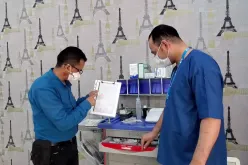UN Volunteer health professionals have been providing much-needed critical healthcare for UN operations in Yemen in times of crisis. Since 2020, the United Nations Volunteers (UNV) programme has deployed 60 UN Volunteer doctors, nurses and other medical providers, almost all of whom are nationals, in UN Clinics administered by the UN Development Programme (UNDP) in seven locations in Yemen.
National UN Volunteers have been playing a key role in providing healthcare to over 6,000 UN staff and their eligible dependents. They carry out daily walk-in consultations, emergency care, inpatient care, follow up of cases and healthcare promotional activities, with proper guidance from international UN Volunteers and senior medical staff, as stipulated in the UN Clinic Standard Operating Procedures.
In addition, they contribute to health consultations, workshops on universal precautions and COVID-19 awareness activities, in cooperation with relevant governmental health departments. The country-wide deployment of these UN Volunteers was meant to keep up with the needs on the ground, and to facilitate the wide international humanitarian response to the crisis in Yemen.
Humanitarian and relief activities are implemented by international and national staff who, in turn, rely on a robust healthcare system to keep them well in the field. Thus, the deployment of UN Volunteer medical workers enables the work of many others. --Abdullah Al Duraibi, UNV Country Coordinator in Yemen
Accordingly, the level of expectations from these UN Volunteers went beyond the commitment required from a health worker to their patients in a normal context. Recruited in the context of a national crisis, compounded with a global pandemic situation, being prepared to go over and beyond, and having the ability to work within diverse teams were critical assets.
UN Volunteer Marwah Al-Maqtari had full understanding of this context when she was recruited as a National Emergency Doctor for the UN Clinic in Sana’a back in May 2020.
"Serving as a UN Volunteer within the COVID-19 team required a disciplined professional commitment around the clock," she explains. For Marwah, being a doctor is not just about treating the patients, it is about "listening to their fears and concerns and staying by their side," as well.
These medical volunteers are part of a larger community of UN Volunteers, including ambulance drivers, human rights advocates, translators, engineers and information technology experts, among others. Together with their colleagues serving UN operations in Yemen, this volunteer community maintains knowledge-sharing platforms, renewable energy sources and updated medical procedures, upon which healthcare systems depend.
Our UN Volunteers learn from one another and work closely together. This high degree of cooperation and learning contributes to capacity building and improves the care we provide. --Dr Florence Fongang, UN Physician/Health Manager with UNDP in Yemen
UN Volunteer Ahmed Al Rough serves as an Emergency Nurse within the UN Clinic in Sana’a. His core duties involve providing primary healthcare to the beneficiaries of the UN Clinic, preparing medical supplies for emergency services and managing referrals. He also plays a key role in updating the daily COVID-19 statistics, which contributed greatly to the review and update of the UN country team's COVID-19 protocols.
"Unfortunately, patients often delay medical services because they are misinformed and dissuaded by stigmas," says Dr Florence. This is an issue the UN Volunteers help to address, benefiting from their position as national volunteers embedded in the local community, which allows them build trust with local beneficiaries.
Alongside his core duties, Ahmed helps counter misinformation. For example, he conducted awareness workshops and developed dashboards, flyers and other information material about COVID-19 pandemic. These activities helped local communities acquire the knowledge and skills needed to reduce disease transmission and increased transparency with real-time situation updates.
Indeed, a devastating economic recession, years of conflict and political insecurity have taken a heavy toll on the healthcare sector in Yemen. These challenges have resulted in under-investment, which limited the access to and quality of medical supplies, services and continuing education opportunities.
However, through their hard work and dedication, UN Volunteers are planting the seeds of positive change. By building trust in national capabilities, they inspire hope for Yemen's post-conflict recovery.

